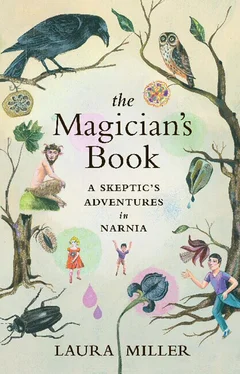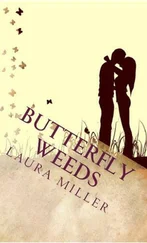In The Magician’s Nephew, the Chronicles’ Creation story, Aslan sends the boy Digory on a quest to a walled garden in the mountains far to the west of the newly made land of Narnia. Digory has been given the task of bringing back a single apple from a tree that grows there, and although Aslan hasn’t told him not to taste the apples himself, an inscription on the gate admonishes all visitors to “Take of my fruit for others” only. There are, of course, the obviously biblical connotations to this walled garden at the beginning of the world, with its semiforbidden fruit. But Digory is no Adam; he has committed his transgression before he arrives at the garden’s gate. He has already unwittingly introduced an evil into Narnia — the sorceress Jadis, who will one day become the White Witch in The Lion, the Witch and the Wardrobe. Aslan sets him the task of fetching the apple as a form of expiation.
Digory’s friend Polly has come along for most of the journey, and the two children travel on the back of Fledge, a talking winged horse. Polly and Fledge are stalwart companions, but at the entrance to the garden they instinctively hang back. “You never saw a place which was so obviously private,” the narrator explains. “You could see at a glance that it belonged to someone else.” It’s all right for Digory to go inside, but not the others. Like all of the most magical places in the Narnia books, the garden is very quiet; even the fountain at its center makes “only the faintest sound.” Jadis, however, has snuck in before Digory, and he spots her there, gorging herself on plundered apples. (I never forgot the “horrid stain” their juice leaves around her mouth, and sometimes I wonder if that’s why my most vivid recollection of Madame Bovary is of her mouth stained by the poison she swallows at the end of the novel.)
Jadis does try to tempt Digory to steal one of these magical, life-giving apples for his gravely ill mother, but unlike Satan she botches the job. This scene touches on the central tragedy of Lewis’s childhood, the death of his own mother from cancer when he was not much older than Digory. The witch invokes Digory’s grief and fear not because she sympathizes (having killed her own sister in an imperial power struggle, presumably she’s immune to such feelings), but because she knows that his love for his mother is his greatest weakness. Digory hesitates to follow her suggestion for a few reasons: because he instinctively trusts Aslan, because he does not want to break his promise, and because he believes that his mother herself wouldn’t approve of him stealing and then lying about it.
Jadis marshals persuasive counterarguments against all of these reservations, but what trips her up is her underestimation of Digory’s affection for Polly, of the power of friendship, a type of love Lewis considered underrated. Thinking that Digory is worried about getting caught, she tells him that he can easily cover his tracks by ditching Polly up in the mountains. In the pinch, Digory rebuffs her, not out of simple obedience to Aslan’s orders, but out of disgust at the “meanness” of the witch’s suggestion that he abandon his friend. Suddenly he perceives everything she’s said as “false and hollow.” The selfish, vainglorious evil she represents advocates more than just rebellion against God — she has subscribed to a radical disconnection from humanity. Symbolically, she has already demonstrated her disregard for natural feeling by violating the garden.
As a metaphor, the garden in The Magician’s Nephew has less in common with Eden than it does with the walled gardens that appear in the medieval courtly romances that Lewis wrote about in The Allegory of Love, his first great scholarly work, published in 1936. He came to Oxford from Belfast when he was in his late teens, and apart from a stint in the army during World War I, he never really left it. The Allegory of Love, an examination of the evolution of the form of allegory from the epics of late antiquity to the chivalric poems of the Middle Ages, made his academic reputation. It was in medieval literature, more than in scripture, that Lewis’s imagination lived and breathed. As arcane as its subject might seem to contemporary readers, for Lewis The Allegory of Love was an extension of his childhood enthusiasm for “knights in armor,” an enthusiasm that lasted all his life, beginning with the creaky historical novels of Sir Arthur Conan Doyle, and threading through the Arthurian works of Tennyson, Thomas Malory, William Morris, and Edmund Spenser.
Lewis adhered to a very particular, almost technical definition of allegory, so when critics later called The Lion, the Witch and the Wardrobe allegorical (or, for that matter, suggested that The Lord of the Rings was an allegory for World War II), he took great pains to correct their error. He had a point — only someone who has a pretty feeble grasp of allegory would mistake The Lion, the Witch and the Wardrobe for one. Some of the book’s elements are symbolic, but that is not the same thing. None of the characters in The Lion, the Witch and the Wardrobe are given labels like Despair or Prudence, nor can they be simply equated with such abstractions, like the figures in a strict allegory, such as John Bunyan’s Pilgrim’s Progress.
Still, the mistake is understandable. Why would most modern readers know anything much about allegory? Today the form is usually derided, rarely read, and never practiced, unless you count the allegories in political cartoons, where a gluttonous hog might appear with the letters “IRS” stamped on its side. The Pilgrim’s Progress is probably the only true allegory contemporary readers have ever heard of, let alone read. As a result, our ability to recognize allegories and to appreciate the best of them has withered away.
Nevertheless, Lewis was a medievalist at heart, and if none of the Narnia books are actual allegories, they are infused with a related affinity for emblems, pageants, and layered symbolism. This was the way his imagination worked, by constructing a series of meaning-drenched images. Lewis didn’t deny that The Lion, the Witch and the Wardrobe was allegory because he disliked the form (as Tolkien claimed to); to the contrary, he thought allegory was unjustly disdained. He believed modern readers required training to read it properly. If they could learn, at least temporarily, to think like the medievals, they would finally grasp allegory’s distinctive, if anti-quated beauty. Then it might give as much pleasure to the average educated reader as it had given to him.
One of the allegories Lewis most admired was The Romance of the Rose, a thirteenth-century French poem begun but not finished by Guillaume de Lorris and completed (to Lewis’s mind in an inferior fashion) by Jean de Meun. The story concerns a young courtier engaged in the delicate process of winning a lady’s love (symbolized by the rose of the title) in accordance with the elaborate protocols of chivalry. His opponents in this quest include figures named Shame and Fear; his chief ally is called Bialacoil, a term, Lewis explains, that is not quite the same as the chivalric principle of courtesy, but fairly similar.
If you check the entry for The Romance of the Rose in The Norton Anthology of English Literature, you will be told that the lover’s personified enemies stand for the “personal and social restraints standing against his advances.” Lewis felt that this sort of all-too-common, slapdash interpretation of allegorical figures — describing them as merely “standing for” something else — missed the point. If, while reading The Romance of the Rose, we see Shame and Fear as no more than broad abstractions (much like the statue symbolizing Justice mounted over many a courtroom), we miss the richness of a medieval allegory, and its intimacy. What we must first remember, Lewis argued, is that the friendly and hostile figures the lover meets are contained within the lady he loves. “Her character,” he wrote, “is distributed among personifications.”
Читать дальше












